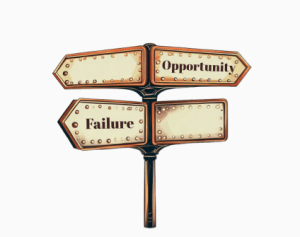Have you ever faced a setback that left you feeling discouraged and uncertain? Failure can be discouraging, but it’s not the final destination. Setbacks are learning experiences that help us grow. In this blog post, I’ll share a perspective that can spark your hope and propel you toward productivity and success.
What is failure?
Failure is the inability to achieve a desired outcome. It is a normal part of life, and everyone experiences it at some point. Failure can be disappointing and discouraging, but it is also a valuable learning opportunity. When we fail, we can identify our weaknesses, develop new skills, and build resilience. We can also learn from the experiences of others and avoid making the same mistakes in the future.
The key to dealing with failure is to learn from it. Reflect on what went wrong and what you could have done differently. Don’t be afraid to admit your mistakes. Create a plan to avoid making the same mistake in the future. And don’t give up. Failure is not the end of the world. It’s just a setback. You can pick yourself up and try again.

Why Making Mistakes is Crucial for Learning
When we learn from our mistakes, our brains release dopamine, a neurotransmitter that helps us learn and remember. However, if we constantly make mistakes and experience negative outcomes, our brains can become wired to expect failure, making it harder to learn and succeed. That’s why it is crucial to allow ourselves to make mistakes, especially when we are learning something new. A study by the University of California, Los Angeles found that people who were allowed to make mistakes while learning a new task performed better on subsequent tasks than those who were not allowed to make mistakes.

How to Use Failure to Improve Productivity
Reframe Failure as Feedback
Instead of viewing failure as a negative outcome, see it as a valuable learning opportunity. It can provide insights into your weaknesses and areas for improvement. Use this feedback to adjust your approach and become more effective. Each failure teaches us something new that we can use to perform better.
Foster a Growth Mindset
Develop a belief in constant learning. Take challenges as opportunities for growth rather than as roadblocks. Recognize that failure is a natural part of the learning process and use it as motivation to push forward, adapt, and improve. Through keeping a growth mindset, you’ll approach failure with resilience and use it as a catalyst for increased productivity.

Reflect and Learn
Take time to reflect on your failures and extract valuable lessons from them. Analyze what went wrong, what could have been done differently, and how you can apply those insights moving forward. Through reflecting on failures and learning from them, you gain valuable knowledge that can guide your future actions, making you more productive and effective in your endeavors.

Adopt a Solution-Oriented Approach
Don’t dwell on failures. Be proactive and develop solutions to overcome challenges. Shift your mindset from problem-focused to solution-oriented thinking. Identify the root causes of failure and brainstorm strategies to address them. This solution-oriented approach will channel your energy into effective problem-solving, propelling you toward better results and success.
Failure is inevitable, but it doesn’t have to be your destiny. Instead, see it as a fuel for learning. With the right mindset, failure can propel you to greater productivity and personal development.




